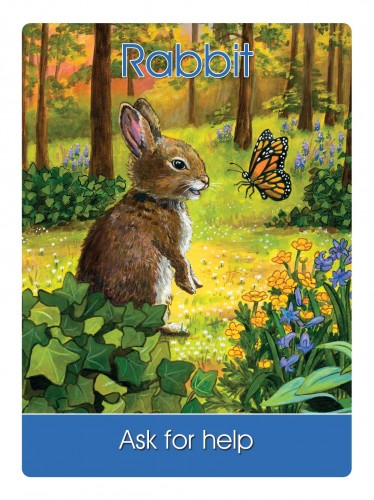(#14) Rabbit’s Message: “Ask for Help”
“Refusing to ask for help when you need it is refusing someone the chance to be helpful.” —Ric Ocasek
“We all want to help one another. Human beings are like that. We want to live by each other’s happiness, not by each other’s misery.” —Charlie Chaplin
I used to pride myself in not having to ask for help. I had this belief that I didn’t need anybody and therefore certainly couldn’t ask anyone for help. Through my life I’ve had a couple of rude awakenings, instances where it was so painful that I had to reach out and ask for the comfort of a trusted friend. What I’ve learned since then is just how amazing people are when you are willing to take the risk and ask for help. Took me awhile to understand that doing so doesn’t mean you’re needy or helpless.
After all, what’s really at risk? Not much at all. I realized that my reticence had to do with my fear of how I would be judged. Of course it was really my own judgments that I feared—that I would be seen as helpless if there was any hint of what I considered a weakness. Besides it was much easier and safer being a helper than the one who is helped since I didn’t have to feel vulnerable. Yet as the quote above stated, not asking for help when needed denies the other person a chance to be helpful.
Spirit (or if you prefer, God) wants to help us and offers guidance in many ways. Spirit expresses as many different forms in the physical world but the one that children (and many adults) most easily and readily relate to are the animals. The Children’s Spirit Animal Cards are intended not only to encourage children’s connection to the natural world, particularly animals, but also to convey certain values that most parents would agree with, such as Rabbit’s encouragement to ask for help.
Animal Cards are intended not only to encourage children’s connection to the natural world, particularly animals, but also to convey certain values that most parents would agree with, such as Rabbit’s encouragement to ask for help.
For children who are dependent on adults through a good portion of their young lives to guide them and care for them, the challenge for parents and guardians is to discern when to allow children to do things autonomously and when to encourage them to ask for help. In the guidebook, the extended message from Rabbit spirit about asking for help gives the child some guidelines:
“Don’t be afraid to ask for help. It’s going to be there if you do, whether a parent, a friend, or sometimes even a spirit guide. It does feel good to be able to do so many things by yourself and for yourself, but what about those things that are so much easier when you have someone help you out? Trying to get something from that top shelf but can’t reach it? How about asking someone to give you a hand by holding on to the ladder so you won’t fall?
“Even though it’s important to do things on your own, whenever you feel any doubt about being able to accomplish those things, ask for help. When homework becomes too difficult, it’s not that you want someone to do it for you, but you can ask for someone, like one of your parents or a tutor, to help you figure it out. If you’re not sure, try asking. Usually the person who helps you feels pretty good about it too.”
There are some activities suggested that further reinforce this idea:
ACTIVITY
* Whether you think you need help or not, make it a point to ask for help today for something rather than just doing it yourself.
* Whenever you feel scared, talk to someone about what you’re afraid of so they can help you with your fears.
* Although it’s important to try things on your own, notice when something seems to be just too much and whenever that is so, ask for help.
* When you pray or talk to Spirit in any way, in addition to expressing your gratitude, you can also ask for help.
In the guidebook parents will also find a few ideas to support the message:
* Model this by asking for help, such as clearing the dinner table, rather than doing everything yourself.
* While you want to encourage your child to do things for themselves, be alert to when they might need extra assistance and ask them if they’d like your help.
* Encourage them to talk about whatever fears they may have, as this is another way to teach them to ask for help.
*Encourage them to notice when others might need help and to offer it. When they see the benefits they feel for helping others, they will feel more inclined to also ask for help.
As a child goes through ages and stages, there’s a continual dance between their natural urges for autonomy and their dependence on their caregivers. As a parent, sometimes they will need more from you and other times you cannot do anything for them because they insist on doing it themselves! As I stated, it can be challenging to determine when to allow this and when to step in, but gradually as the child matures, with parental support they will learn to do many things for themselves as well as ask for help at the appropriate times.
“Asking is the beginning of receiving.” —Jim Rohn




 (
(


